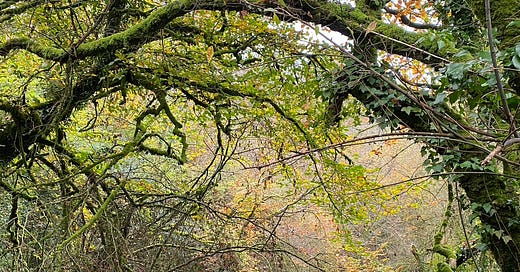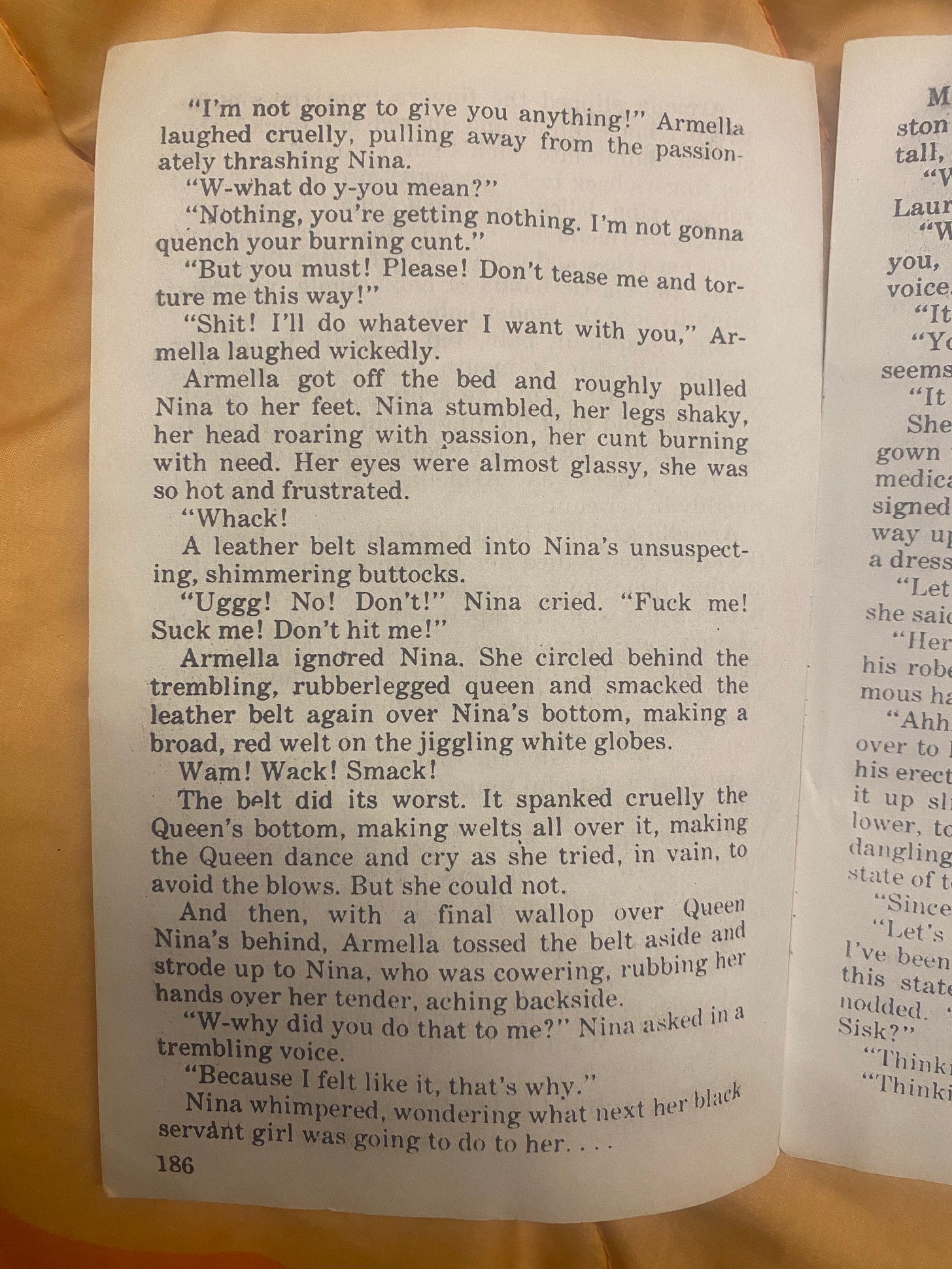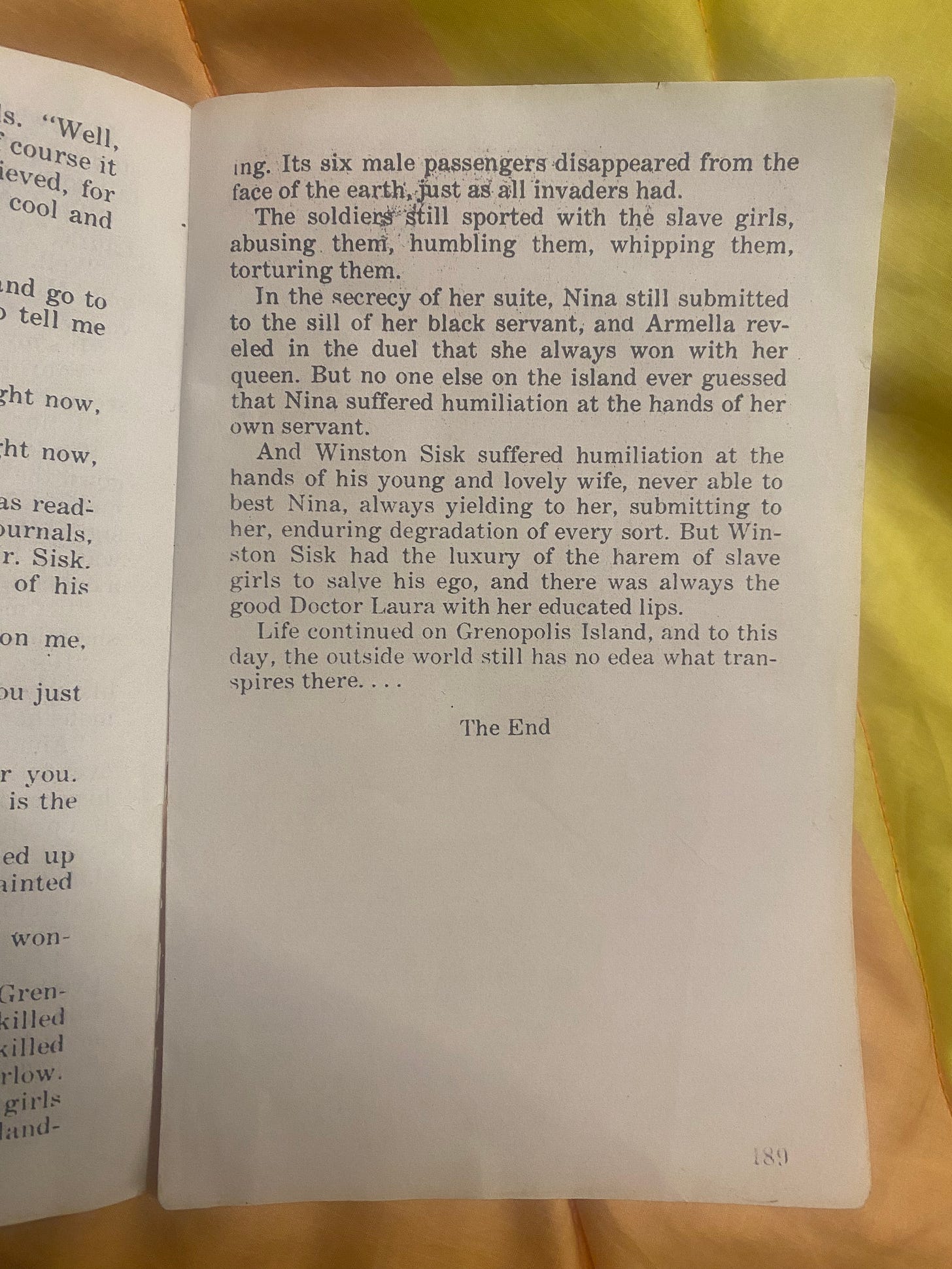A bit of bric-a-brac for you from my writing stall.
I’ve been writing on Substack for about a year now which means the app might be trying to take money off you again, particularly if you’re an annual subscriber.
If you can afford it, let the app take the money as it ends up coming my way (most of it) and then I can buy more Lidl sausages and second-hand Penguin classics.
Having said that, what with everything being twenty-four per cent more expensive these days,1 you might need to make changes. These are your options:
If you become a Paid Subscriber the app will give you three choices:
Monthly Subscriber £5
Annual Subscriber £50
Founding Subscriber £250
If you remain a Free Subscriber do consider dropping me a tenner every now and then via PayPal or Stripe.
Thank you, on with the Roving.
The English Cretin
On a winter Wednesday in January we crossed the road causeway in the van to Holy Island at Lindisfarne on the north-east coast of England.
It is a place of wide horizons, wading birds, big skies, seascapes, mudflats, and sand dunes anchored by marram grass.
The water that swamps the road twice a day moves fast, and it should never be attempted during a rising tide, unless you want to spend the night stranded in a refuge shelter the size of a small shed on stilts.
Before crossing we watched the rain race over the land and sea, then took a slow drive across, to be greeted by two white egrets and a rainbow.
While we were there Tara met a stern but sociable Scottish man from Selkirk who spoke of his new neighbour back home, referring to him as ‘the English cretin’.
After purchasing the adjoining plot of land ‘the English cretin’ put up fencing and a total of nine gates, each with a sign on.
The man from Selkirk took umbrage. He told Tara that in Scotland ‘there’s not so many signs telling you what you can do or where you can go.’
He’s taking his new neighbour to court to get the signs removed ‘spending a few grand on principle’.
We would drive to Scotland the following day, spending the next ten months there, and I can tell you he was right: compared to England there are fewer signs telling you what you can do or where you can go.
Scottish freedom to roam was established in 2003. The Act marked the moment when the hills, valleys, moors and waters of Scotland opened up to those wishing to make overland journeys unhindered by mean-spirited expulsive signs.
Cretinous neighbours who seek to despoil, take note, and here’s to the man from Selkirk - more power to your elbow.
The Last Interview
It hasn’t always been this way.
There were times, not so long ago, when people were possessed of principles and ideas that meant something, values were upheld, and decisions were made based on a sense of right and wrong, according to conscience.
Today, everything has a price, and as insatiable atomised consumers, we are devouring the world.
And yet, goodness still exists within us: our consciousness enables us to create beauty on Earth, at the behest of the gods.
Increasingly this human response to the miraculous is merely a rumour, a whisper of what once was, washed away by the system we created.
But consciousness, and the human spirit it animates, endured.
Maybe we won’t pull out of the kamikaze dive before it’s too late: it is easier to imagine the end of the world than manifest an alternative.2
So why go on?
Well, for love and life and death, for goodness and quality, and making the right choice, for meaningful work, and for people with principles, such as this man.
Behold, Dennis Potter.
Phone Box Filth
The old British Telecom telephone box opposite the Kings Arms on Portesham green in Dorset is painted a handsome green to blend in with the picturesque village surroundings.
The K6 (Kiosk No 6) is one of eight types introduced by the General Post Office between 1926 and 1983.
The K6 was designed by British architect Sir Giles Gilbert Scott3 to commemorate the Silver Jubilee of the coronation of King George V in 1935. Sixty-thousand were installed across Britain and the K6 became the defining model.
The Portesham kiosk was put in place sometime after 1949 when the Royal Fine Arts Commission4 allowed rural boxes to be painted in different colours such as green and battleship-grey.
Featuring an impression of the coronation crown, illuminated signs and a teak door, the cast iron kiosk has battled to keep its handsome green livery each time maintenance staff arrived to perform the five-yearly refurbishment.
In 2011 villagers awoke aghast to find it had been prepared with a red undercoat ready for the official Currant Red Telephone Box K6 gloss repair paint. The parish council intervened and BT capitulated.
In 2016 the parish council paid one-pound and took it on through BT’s Adopt a Kiosk programme, turning it into a book swap library to replace the mobile library which used to visit the village.
A few weeks ago we were passing and stopped to swap. While browsing I found a few loose pages from an unidentifiable text secreted between two other books. I scanned the first few lines and was impressed to discover it was phone box filth.
If you’re interested, the action begins on p.185 and takes place on Grenopolis Island, where black servant girl Armella is having her way with Nina, whose husband, Mr Winston Sisk, is entertaining Dr Laura Fielding in his private quarters.5
Farmers with mud on their boots
I asked a farmer I know what he thought of the new inheritance tax on farms6 proposed by Rachel from Accounts.7 This was his response:
‘I’m trying not to think about it: if we die tomorrow the children will have to find about a million-pounds. The only way to pay that off is to sell the farm. Then of course there will also be capital gains tax and sellers tax to pay. They will be left with the house if they are lucky and nothing to provide any income.’
Many farmers point out that while they may be asset rich, they are cash poor because farm incomes have plummeted owing to inflation, poor harvests and punishing competition among retailers. They say many farmers take home less than the minimum wage.
Pretend-farmer Jeremy Clarkson defied his doctors to be at a march protesting the changes and even hired two coaches to take farmers from the Cotswolds to London.
His presence inevitably attracted more media attention, not least from the BBC’s Victoria Derbyshire who had a rather inconvenient question for him about his motives, based on things he had written in the past.
In a 2021 interview with The Times, Clarkson said that avoiding inheritance tax was ‘the critical thing’ in his decision to buy land, and in a post on the Top Gear website in 2010, he said, ‘I have bought a farm. There are many sensible reasons for this: Land is a better investment than any bank can offer. The government doesn’t get any of my money when I die. And the price of the food that I grow can only go up.’
He was visibly stumped by Derbyshire’s question8 and tried to recover by ranting about the BBC, but by then, his true agenda lay exposed.
He later tried to excuse his performance by saying he was in a ‘fog of painkillers’ and ‘could have given a better account of myself’.9
‘The only reason I said that is because I actually bought the farm because I wanted to shoot, but you can't go around saying ‘Oh, I wanted to shoot’ because then you get shouted at by animal enthusiasts.’10
What this farce highlights is that wealthy people have been buying farms to avoid paying inheritance tax for years. I can only imagine the myriad of negative consequences this may have had for farmers, farms and food in this country.
Where 64-year-old Clarkson proffered bluster and bullshit, British farmer Guy Singh-Watson, also 64, offered stark clarity.
Singh-Watson is the founder of Riverford, an organic farm and organic vegetable box delivery company, and he is glad to see tax loopholes closing for cynical investor landowners.
He acknowledged Rachel Reeves’s inheritance policy could have been better designed, but believes it will help farmers with ‘mud on their boots’:
Should multimillionaire landowners benefit from a tax break designed to help small family farms pass down their land to their children?
Granted, 20% is still only half of the standard inheritance tax rate, and it probably sounds more than generous to an ex-miner, foundry worker or shipbuilder. But today, £1m would only buy you about 40 hectares (100 acres) of farmland, which is far short of a viable farm.
…we should be honest about where the loudest opposition to this policy is coming from. The unintended consequence of the tax break given to landowners has been to inflate land prices and effectively exclude new entrants who don’t stand to inherit by making buying your first field unaffordable to most of the people actually doing the farming.
It should offend all farmers with mud on their boots that multimillionaire landowners who are helping to make farming less affordable for genuine farmers are claiming to represent us.
For those who are pushing the hardest against this change to inheritance tax, don’t be fooled: they don’t represent farmers, they represent the super-rich who don’t want to contribute their fair due, and are simply buying up our country to keep more money and assets for themselves.11
During earlier conversations with my farmer friend, I recall him acknowledging some of these difficult truths himself: that the wealth accumulated due to the value of the land going up over time is not rightfully his, that he didn’t earn it, and that it happened simply because of market forces (I paraphrase).
Having said that, it’s not necessarily a good reason to take it all off him when he dies.
Or is it?
Early one morning in July, alone on a pristine Scottish beach
If you’ve got something to say, write a comment. I will read and respond (eventually).
Please consider sharing my words. That's how I find new readers.
Compared with October 2020, prices of goods and services are twenty-four per cent higher - driven by increases in food and energy prices.
‘It's easier to imagine the end of the world than the end of capitalism.’
According to Mark Fisher, the quotation ‘it is easier to imagine an end to the world than an end to capitalism’, attributed to both Fredric Jameson and Slavoj Žižek, encompasses the essence of capitalist realism.
From Capitalist Realism: Is There No Alternative? by Mark Fisher (2009).
From the aftermath of the Great War to the eve of the Third Millennium, the Royal Fine Arts Commission, appointed by royal warrant in 1924, gave elite architects and designers a platform to apply their minds to a democratic cause, putting in countless hours (freely in the public interest) analysing the design of buildings, roads, bridges, and street furniture, including telephone boxes.
Rachel Reeves, the chancellor, announced in her budget that from April 2026, inherited agricultural assets worth more than £1m, which were previously exempt, will be liable to the tax at 20%, half the usual rate.
Reeves embellished some of her past achievements then retrospectively edited her CV, making it look significantly less impressive, after it came under scrutiny. During Prime Minister's Questions on 20th November, Reform UK MP Lee Anderson joked that ‘Rachel from Accounts’ ought to place her CV ‘in the trash can’.
Clarkson v Derbyshire:
The lady doth protest too much, methinks.
Hamlet by William Shakespeare (1623).









